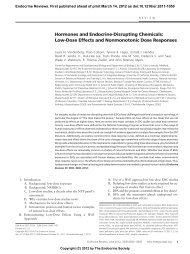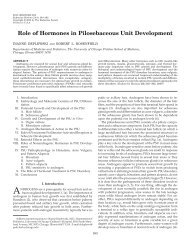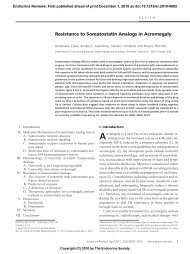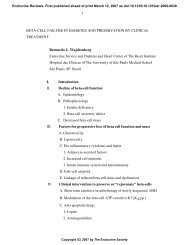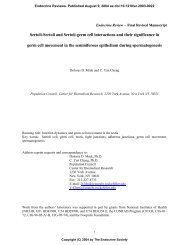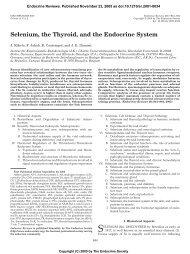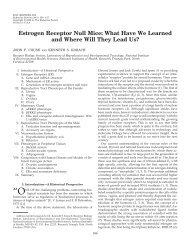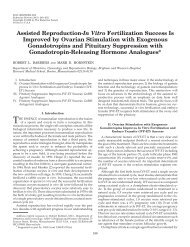You also want an ePaper? Increase the reach of your titles
YUMPU automatically turns print PDFs into web optimized ePapers that Google loves.
Aromatase inhibitors (AIs) are a class of drugs that inhibit the enzyme aromatase, which<br />
is responsible for converting androgens (produced by women in the adrenal glands) to<br />
estrogen, thereby lowering the circulating, and perhaps the tumor levels, of estrogen. By<br />
depriving <strong>ER</strong> of its estrogen ligand (4-6), AIs inhibit tumor growth and are proving<br />
superior to tamoxifen at least in certain patient subsets (2, 7-9). However, the response<br />
rate to these compounds is only slightly higher than the response rate to tamoxifen in<br />
patients with advanced breast cancer, and both de novo (i.e. immediate) and acquired<br />
resistance after an initial response commonly occur.<br />
The membrane tyrosine kinase H<strong>ER</strong>2 (c-ErbB2, H<strong>ER</strong>2/neu) is gene-amplified in 20-25%<br />
of <strong>ER</strong>-positive breast cancer (10). There is clinical evidence that tamoxifen is less<br />
effective in H<strong>ER</strong>2-positive tumors (11-13). Furthermore, preclinical models show that<br />
H<strong>ER</strong>2 overexpression can cause tamoxifen-stimulated growth as a mechanism of de novo<br />
resistance (14-17) and that the H<strong>ER</strong> family receptors are also implicated in acquired<br />
resistance to this drug (18). Advanced studies of <strong>ER</strong> biology have revealed new insights<br />
into <strong>ER</strong> action in breast cancer and have highlighted the role of an intimate cross-talk<br />
between the <strong>ER</strong> and the Epidermal growth factor receptor (EGFR/H<strong>ER</strong>1)/H<strong>ER</strong>2<br />
signaling pathways as a fundamental contributor to the development of resistance to<br />
endocrine therapies (19-21).<br />
Accumulating knowledge of the mechanisms by which breast cancer cells become<br />
resistant to endocrine therapy, coupled with the availability of new compounds that can<br />
interfere with the growth factor-driven signaling pathways involved in resistance to<br />
4



